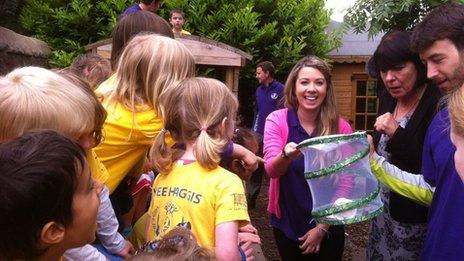'Right to childcare' timetable call from MSPs
- Published

The committee wants to see a statutory right to childcare introduced in Scotland
A fundamental transformation of childcare in Scotland is needed, according to a group of MSPs.
Holyrood's equal opportunities committee has been looking at issues surrounding women and work.
In his speech to the SNP conference earlier this year First Minister Alex Salmond pledged to make childcare a top priority in an independent Scotland.
The committee wants a timetable set for introducing a statutory right to care for every child up to the age of 15.
It said such a move, along with more flexible working patterns, could transform women's access to work.
Launching the committee's report on a visit to the Highland Fling Nursery and Out of School Club in Edinburgh, convener Mary Fee MSP said: "Despite the Equal Pay Act of 1970 and the Sex Discrimination Act of 1975, women are still swimming against the tide and we continue to address persistent inequality between the sexes decades on.
"Childcare is at the heart of this, together with the outdated presumption that women alone will shoulder the greatest responsibility for that childcare and the knock-on effect that has on women and work.
"This is why we are asking the Scottish government to outline a timetable for the introduction of a statutory right to childcare, including older and disabled children."
Occupational segregation
Last year ministers outlined plans to increase free pre-school childcare, but MSPs on the equal opportunities committee said changes must go beyond that age group.
They found childcare provision often disappears when youngsters go to school and holidays can often cause problems for working mothers.
The committee wants childcare to be guaranteed for all those aged up to 15.
The MSPs' report said there were clear indications of good work and initiatives aimed at helping women with children back to work. However, it said inequality between the genders remained.
The committee said the government and public sector should lead by example - making all jobs available to candidates seeking part-time or flexible working.
Ms Fee added: "On a practical and immediate basis, we believe there is a clear leadership role for the public sector and all jobs in the Scottish government's direct control should be advertised as suitable for flexible working or part-time basis."
The committee's report also highlighted the role schools can play in tackling occupational segregation.
It agreed sector representatives from industry could be brought into schools to enhance careers advice at an early stage.
MSPs highlighted occupational segregation in the modern apprenticeship scheme and said it was vital these gender imbalances were addressed.

The committee said childcare provision often fell away once youngsters reached school age
A coalition of children and family charities has backed the committee's call for an overhaul of childcare infrastructure in Scotland.
Jackie Brock, chief executive of Children in Scotland, said: "Quality and affordable childcare is an investment in children's future which supports educational achievement and helps narrow the gap in inequalities, it allows parents - mothers particularly - to return to work, if they wish, knowing their children are in safe hands.
"We warmly and whole-heartedly support the recommendations of the committee to extend statutory childcare provision up to the age of 15 but would ask that in determining the best way forward, quality, affordability and support for the childcare workforce remains paramount."
The Scottish government has also issued a statement in response to the committee's report.
It said: "The Scottish government is committed to use the powers of an independent nation to transform childcare to rival the best in Europe.
"We have started by introducing legislation to increase nursery provision to 600 hours, the highest level in the UK.
"This is just one aspect of the excellent work already being done across Scotland to support parents, carers, children and young people, to improve the support available and give our children the best start in life.
- Published23 March 2013
- Published6 March 2013
- Published19 July 2012
- Published4 July 2012